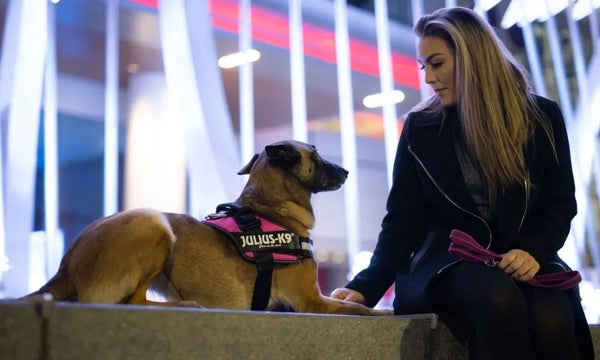
The Different Types of Service Dogs
Many consider a dog their best friend, but for some, their canine companion is also an assistant; various service dogs exist to help those with disabilities complete daily tasks and to keep an eye on them. While some work to guide the blind, others support and bring comfort to individuals. Understanding the different types of service dogs will help you better understand their many responsibilities.
Guide Dogs
When many of us hear of the term “service dog”, we think of those who guide individuals with visual impairments. Often, labradors do this job because of their large size, even temperament, and strong work ethic; however, other breeds that often work this job include:
- Golden Retrievers
- German Shepherds
- Poodles
These dogs often accompany their owner to public locations. While they're not required to wear any equipment or a vest, many wear a special harness so their owner can hold onto them and the dog can lead them around.
Hearing Dogs
While guide dogs help lead the visually impaired, hearing dogs assist the hearing impaired by alerting them to various sounds they may not hear. To work as a hearing dog, the canine must:
- React attentively to sound
- Be friendly and confident
- Remain focused
Specialized training teaches these dogs to lead their owners towards the sound. While golden retrievers, labradors, and poodles often work this job, cocker spaniels also fit the bill; however, rescue dogs or mixed breeds are also quite common so long as the dog has an even temperament and good trainability.
Alert Dogs
A service dog may work after the proper training as an alert dog for diabetes; their powerful sense of smell allows dogs to smell shifts our bodies go through during some events. Regardless of breed, a dog working this job must be confident and react well in crowds.
Diabetic alert dogs smell the scent change humans go through when their blood sugar drops too low or gets too high; these dogs bark to remind or warn their owner, but also may find help from others.
Emotional Support Dogs
Emotional support dogs help various individuals, including those with:
- Anxiety Disorders
- Post-Traumatic Stress Disorders
- Autism Spectrum Disorder
Like service dogs, these canines receive training to ensure they provide their owner with the comfort they need; moreover, training ensures these dogs react appropriately in public. However, unlike the other service dogs mentioned above, these working dogs don’t receive training on a particular task but instead comfort their owners. They may face more restrictions than a service dog.
Canines fill all sorts of roles in our lives; while some of the different types of service dogs may wear a professional dog harness, others bring much-needed comfort to those in distress. Julius K9 offers collars, leashes, and more, for service dogs and regular dogs.



